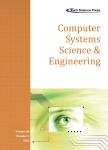Artificial Intelligence Based Sentence Level Sentiment Analysis of COVID-19
作者机构:Department of Software EngineeringUniversity of Management and TechnologyLahore54770Pakistan School of Computer ScienceThe University of SydneySydneyAustralia Department of Computer ScienceCollege of ScienceNawroz UniversityDuhok42001Kurdistan RegionIraq College of Computer Science and Information TechnologyUniversity of AnbarAnbar31001Iraq Department of Computer ScienceUmm Al Qura UniversityMecca24211Saudi Arabia Computer Science DepartmentFaculty of Computers and InformationKafrelsheikh UniversityKafrelsheikhEgypt
出 版 物:《Computer Systems Science & Engineering》 (计算机系统科学与工程(英文))
年 卷 期:2023年第47卷第10期
页 面:791-807页
学科分类:0502[文学-外国语言文学] 050201[文学-英语语言文学] 05[文学]
主 题:COVID-19 artificial intelligence machine learning deep learning sentimental analysis support vector classifier
摘 要:Web-blogging sites such as Twitter and Facebook are heavily influenced by emotions,sentiments,and data in the modern ***,a widely used microblogging site where individuals share their thoughts in the form of tweets,has become a major source for sentiment *** recent years,there has been a significant increase in demand for sentiment analysis to identify and classify opinions or expressions in text or *** or expressions of people about a particular topic,situation,person,or product can be identified from sentences and divided into three categories:positive for good,negative for bad,and neutral for mixed or confusing *** process of analyzing changes in sentiment and the combination of these categories is known as“sentiment analysis.In this study,sentiment analysis was performed on a dataset of 90,000 tweets using both deep learning and machine learning *** deep learning-based model long-short-term memory(LSTM)performed better than machine learning *** short-term memory achieved 87%accuracy,and the support vector machine(SVM)classifier achieved slightly worse results than LSTM at 86%.The study also tested binary classes of positive and negative,where LSTM and SVM both achieved 90%accuracy.



